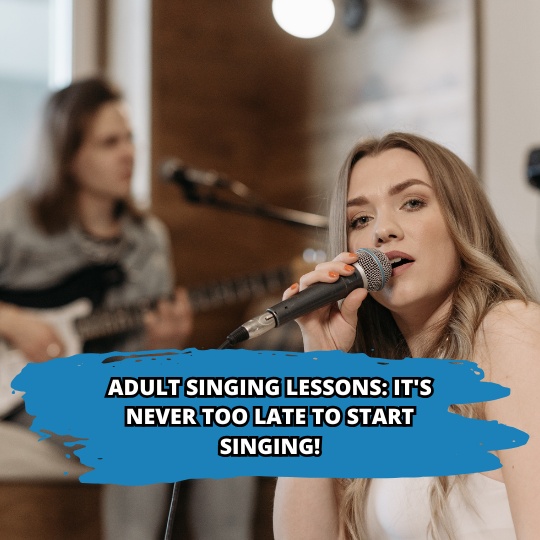Adult Singing Lessons: It’s Never Too Late to Start Singing!

Learning to sing as an adult offers numerous benefits, both personal and social. Adult singing lessons are not just about developing a beautiful voice; they also provide cognitive, emotional, and physical advantages. Adults often find singing to be a therapeutic and creative outlet, helping to reduce stress and improve mental clarity. With structured guidance from a qualified instructor, adults can achieve significant improvements in pitch, tone, and vocal control, regardless of their starting skill level.
Why Adults Should Consider Singing Lessons
Benefits Beyond Singing
Singing lessons offer much more than just vocal improvement. They help enhance lung capacity, posture, and breathing control, which have positive effects on overall physical health. Singing has been linked to reduced stress hormones, increased endorphins, and improved mood. Adults who take singing lessons often report heightened self-confidence, especially in public speaking or social situations. Additionally, the discipline and focus required in adult singing lessons can boost cognitive abilities, including memory and concentration.
Myths About Adult Singing Lessons – Debunked
One common myth is that adults cannot learn to sing as effectively as children, but this is entirely false. While children may adapt faster to certain techniques, adults have the advantage of better focus, self-discipline, and a clear understanding of their goals. Another misconception is that only those with “natural talent” can learn to sing well. In reality, vocal improvement comes from consistent practice and guidance, not just innate ability. Additionally, some believe that adult singing lessons require a massive time commitment, but even short, regular sessions can yield substantial progress.
What to Expect from Your First Adult Singing Lesson
Setting Realistic Goals for Your Singing Journey
The first step in adult singing lessons often involves setting clear, achievable goals. Goals may range from mastering a single song to developing advanced vocal techniques over time. Instructors typically assess your current abilities, discuss your musical preferences, and outline a personalized learning plan. It’s important to approach these goals with patience, as vocal improvement is a gradual process. Progress will depend on your commitment, practice consistency, and openness to feedback from your instructor.
How Lessons Are Structured for Adult Learners
Adult singing lessons are typically structured to fit the specific needs and schedules of grown learners. Lessons often begin with warm-ups and breathing exercises to prepare the vocal cords and enhance breath control. Following this, exercises focus on pitch accuracy, vocal range, and tone quality. Repertoire selection is often tailored to align with your musical tastes and vocal strengths. Lessons may also include music theory basics, helping adults understand how to read sheet music and interpret musical symbols effectively.
Common Challenges Adults Face in Singing Lessons (And How to Overcome Them)
Overcoming Stage Fright and Self-Doubt
Many adults face stage fright or feel self-conscious about their singing abilities, especially in group settings. Overcoming this challenge starts with creating a safe and supportive learning environment where mistakes are viewed as opportunities for growth. Instructors often incorporate relaxation and mindfulness exercises to help students manage anxiety. Gradual exposure to performing in front of others, starting with singing in private or in small groups, can build confidence. Regular practice also helps reduce self-doubt as improvement becomes noticeable over time.
Building Vocal Strength and Flexibility
Developing vocal strength and flexibility can be more challenging for adults who have never trained their voice before. Adult singing lessons often focus on exercises that strengthen the diaphragm and improve breath control. Flexibility exercises, such as scales and arpeggios, help adults navigate different vocal registers with ease. Patience is essential, as these improvements require consistent, focused practice. Hydration and vocal rest are also crucial for maintaining vocal health, especially after long practice sessions.
Tips for Making the Most of Your Adult Singing Lessons
Consistency is Key: Practice Tips for Adults
Consistency is one of the most important factors in achieving progress in adult singing lessons. Regular short practice sessions, even just 15–30 minutes a day, are far more effective than infrequent long rehearsals. Recording practice sessions allows students to track their progress and identify areas for improvement. Warm-ups should never be skipped, as they prepare the voice for both practice and performance. Creating a dedicated practice space free from distractions can also improve focus and productivity.
Finding the Right Vocal Coach for Your Needs
Finding the right vocal coach can make a significant difference in your singing journey. A good instructor will tailor lessons to your skill level, musical preferences, and goals. It’s essential to find someone who communicates clearly, offers constructive feedback, and creates a positive learning environment. Many adults benefit from trial lessons with different instructors before committing to one. Whether you’re looking for in-person sessions or prefer online adult singing lessons, compatibility with your coach is key to long-term success.
Exploring Different Singing Styles in Adult Singing Lessons
Choosing the Right Singing Style for You
Adult singing lessons often cover a variety of vocal styles, including classical, jazz, pop, rock, and musical theatre. Exploring multiple styles can help adults discover their natural vocal strengths and preferences. Many instructors encourage students to try different genres to build versatility and improve vocal control. Having a style you’re passionate about also enhances motivation and consistency in practice.
Understanding Vocal Techniques Across Styles
Different singing styles require unique vocal techniques. For example, classical singing focuses heavily on projection and operatic vibrato, while pop singing emphasizes a relaxed, natural sound. Adult singing lessons often teach students how to adapt their vocal techniques to suit their chosen genre. Learning these nuances not only enhances performance but also prevents vocal strain from incorrect technique application.
The Mental and Emotional Benefits of Adult Singing Lessons
Reducing Stress Through Singing
Singing has been scientifically proven to lower cortisol levels, which helps reduce stress and anxiety. Adult singing lessons provide an emotional outlet, allowing students to express feelings through music. The rhythmic breathing involved in singing also promotes relaxation and a sense of calm.
Boosting Self-Confidence Through Progress
Seeing tangible progress in singing ability can significantly boost self-confidence. Whether it’s hitting a high note for the first time or performing in front of an audience, these milestones foster a sense of achievement. Adult singing lessons often emphasize celebrating small wins, keeping students motivated and positive about their progress.
Conclusion: Take the First Step Toward Your Singing Journey
Singing is a skill that can be developed at any age, and adult singing lessons offer a structured path to achieving your vocal goals. With patience, consistent practice, and the right guidance, adults can experience both personal and musical growth. Whether you’re looking to sing for fun, join a choir, or perform on stage, taking that first step toward singing lessons is the beginning of a rewarding and fulfilling journey.
FAQ
Q: Do I need any prior experience to start singing lessons?
A: No prior experience is necessary to start adult singing lessons. Instructors are trained to work with beginners and will guide you through foundational techniques to build your confidence and vocal ability.
Q: How long does it take to see improvement in my singing voice?
A: Improvement varies for each individual, but most adults notice progress within a few weeks of consistent lessons and practice.
Q: Can I take online adult singing lessons?
A: Yes, many instructors offer online adult singing lessons, which provide flexibility and convenience.
Q: Is singing good for mental health?
A: Yes, singing has been shown to reduce stress, improve mood, and increase feelings of relaxation through endorphin release.
Q: How do I prepare for my first singing lesson?
A: Stay hydrated, get enough rest, and approach your first lesson with an open mind and a willingness to learn.


